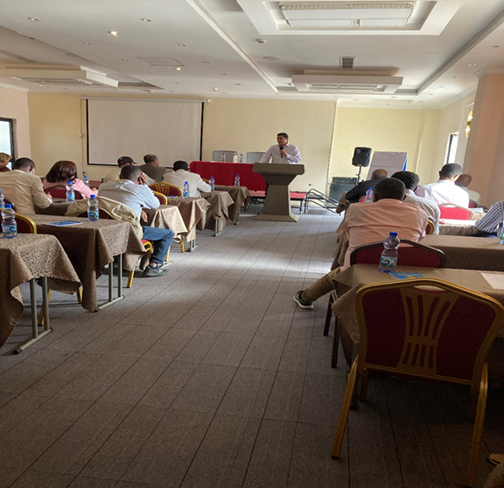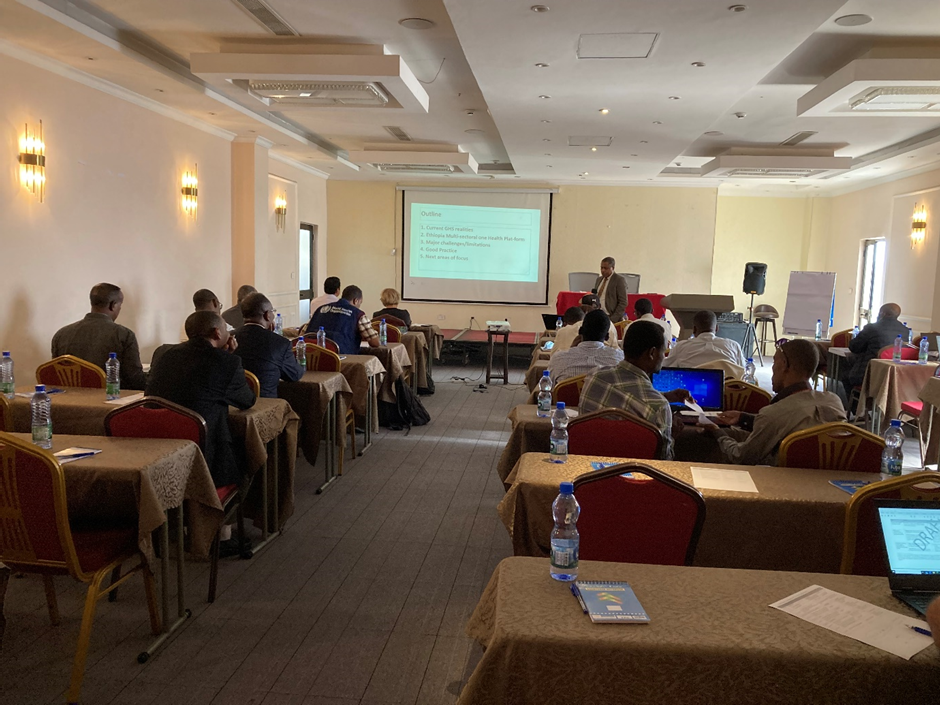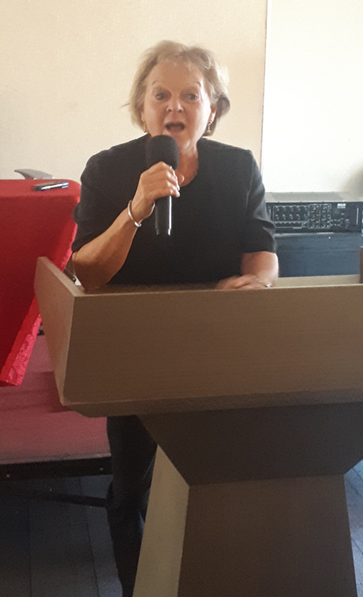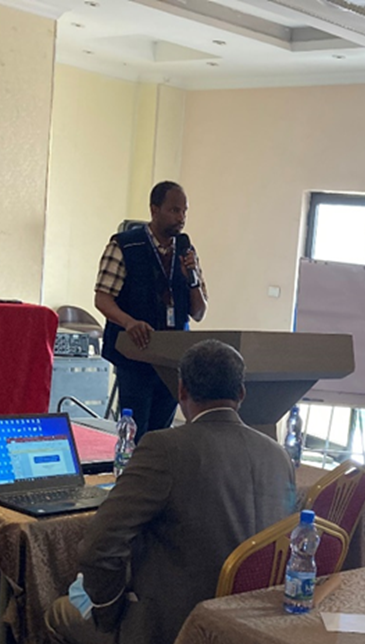
Ethiopia has adopted a One Health (OH) approach and has made significant progress in strengthening human resources, facilities and developing and implementing cross-sectoral strategies in collaboration with partners. UKHSA and the WHO Country office in Ethiopia have an agreed joint plan of activities and work closely together to contribute to the operationalization of OH in the country. This initiative is a new way of working for the IHR-strengthening project and builds on UKHSA’s strong links with the WHO AFRO OH team.
The Subnational OH Taskforce Review Meeting was held on 14th of October 2022 in Adama, hosted by UKHSA in collaboration with WHO and the Ethiopia National OH Steering Committee. The purpose of the meeting was to review and discuss progress towards implementation of OH platforms sub-nationally and progress made in collaboration, coordination and communications between the National One Health Steering Committee (NOHSC), Regional One Health Taskforces (ROHTF), and other organisations. Objectives of meeting were:
- To review the achievements, best practices, and challenges from NOHSC and ROHTF
- To create networking and experience sharing among ROHTF and with NOHSC
- Discussion and way forward on the raised issues to strengthen and operationalise national and sub-national OH platforms in Ethiopia
The NOHSC and the WHO-UKHSA partnership initiative presented their planned activities for the next year, with facilitation led by Dr Baye Ashenefe (UKHSA) and Dr Mohammed Abdikadir (WHO) in collaboration with members of the National Steering Committee (Mr Behailu, Dr Feyesa, Dr Wondosen and Mr Shiferaw). A total of 33 participants attended including representatives from the NOHSC, Ministry of Agriculture, Ministry of Health, Ethiopian Public Health Institute (EPHI), Ethiopia Wildlife Authority, Ministry of Environment, all subnational task forces and other partners such as International Livestock Research Institute, Resolve to save life, WHO,Veterinaires Sans Frontieres.
Welcome remarks and keynote address was delivered by Sajil Liaqat, UKHSA Country lead, who welcomed everyone and highlighted the important work being undertaken by UKHSA in the country in collaboration with EPHI, Africa Centres for Disease Control and Prevention, WHO and other national government organisations in workforce development, improving laboratory capacity building, emergency response, chemical incidents and OH. He emphasised the need to strengthen and operationalise OH nationally and sub nationally, a focus of WHO and UKHSA.

The opening session was led by the Ethiopian Minister of Agriculture, Dr Wondwosen Bekele, who expressed the importance of strengthening OH implementation in improving public health and thanked the UKHSA and WHO for supporting the operationalisation of OH initiatives at national and subnational levels and the results that have been achieved so far.
This was followed by presentations by the NOHSC and the Regional OH Taskforces which focussed on the key achievements, best practices, challenges, and planned activities identified to cascade to the subnational taskforces. Some of the key achievements included: disease prioritisation; OH strategies and guideline development; conducting joint outbreak investigations; and the establishment of ten Regional OHtaskforces. Key challenges identified included multi sectoral resource mobilisation and sector-based budget allocation, solutions for resource mobilisation, laboratory capacity building, coordination, collaboration and communication enhancement.
The WHO-UKHSA partnership also presented, and focussed on themes of the partnership, objectives, approaches and the activities delivered so far in strengthening and operationalising OH in Ethiopia.

This was followed by group presentations and subsequent group discussions, where the challenges from the National and subnational taskforces were used to form the agenda around the three key highlighted areas of: laboratory capacities and facilities; coordination, collaboration and communication between Regional taskforce members and the NOHSC; and resource mobilisation and sector-based budget allocation. The next steps from the meeting included: the NOHSC cascading prioritised activities to all partners; each Regional OH Taskforce organising similar review meetings to align their annual activities with the national OH plan, and to advocate their political leaders and technical experts in the Region be aware and support the implementation of a OH approach.
The Program was officially closed by Dr Feyesa Regassa, EPHI, chair of the NOHSC by thanking everyone for coming together and sharing their experiences, challenges and learning from each other. He extended thanks to UKHSA and OH team for hosting and organising the event, their active participation, and high-level professional contributions.

“No one sector can solve the many problems we face alone. To secure human, animal and environment health – to secure the very future of this planet – we need more collaboration and partnerships. We need to stand together and work together. WHO-UKHSA partnership is a new initiative to synergise the efforts for more impact and to strengthen and operationalisations of One Health in Ethiopia. This review meeting is organised by WHO-UKHSA to review the progress, best experiences and main challenges, and accordingly we have got great lessons from the National Steering Committee as well as the subnational One Health taskforces and this is to reassure that we are ready to do our part based on the action points of this review meeting and keen to see the results.”
- Prof. Dilys Morgan, Consultant in Global Health, IHR-Strengthening Project, UKHSA

“WHO and UKHSA are working to increase the adoption of the One Health approach in national and regional level through combined energies, WHO-UKHSA have developed One Health Joint Plan of Action which was supported and advised by the One Health High-Level Experts from WHO and UKHSA. The joint plan aims are to operationalise One Health at regional and national levels, emergency response and prevention and control of rabies in Ethiopia. This review meeting is also one of the componenst of the joint plan, and from this review meeting challenges are identified to put in actions and accordingly we are ready to do our parts based on the action points of this review meeting’’
- Dr. Mohammed Abdikadir, One Health Focal Point, WHO
By Baye Ashenefe Wassie